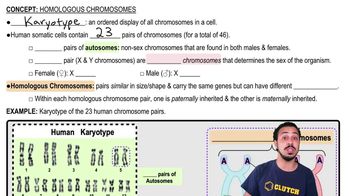12. Meiosis
Homologous Chromosomes
12. Meiosis
Homologous Chromosomes
Additional 1 creators.
Learn with other creators
Practice this topic
- Multiple Choice
The human karyotype shown below:
a) Is of a haploid cell.
b) Is from a gamete.
c) Shows 23 chromosomes.
d) All of the above.
- Multiple Choice
How might the two members of a pair of homologous chromosomes differ from each other?
a) In the sequence of the DNA making up each of the chromosomes.
b) In the relative position of the genes present on each of the chromosomes.
c) They cannot differ if they are homologous.
d) In the kinds of genes present on each of the chromosomes.
- Multiple ChoiceA karyotype is __________.
- Multiple ChoiceWhich of the following statements about homologous chromosomes is correct?
- Open QuestionWhat are homologous chromosomes?a. chromosomes that are similar in their size, shape, and gene contentb. similar chromosomes that are found in different individuals of the same speciesc. the two chromatids in a replicated chromosomed. any chromosome in a diploid cell
- Open QuestionA human cell containing 22 autosomes and a Y chromosome isa. a sperm.b. an egg.c. a zygote.d. a somatic cell of a male.
- Open QuestionIf humans have 23 pairs of chromosomes, each carrying hundreds to thousands of genes, roughly how many genes are there in the human genome?a. 23;b. 46;c. 1000;d. 20,000;e. 200,000
- Open QuestionHomologous pairs of chromosomes .a. are two different chromosomes attached to each other;b. are exact copies of one chromosome that are attached to each other;c. are separated from each other during meiosis I;d. are separated from each other during interphase;e. are chromosomes that carry different genes





